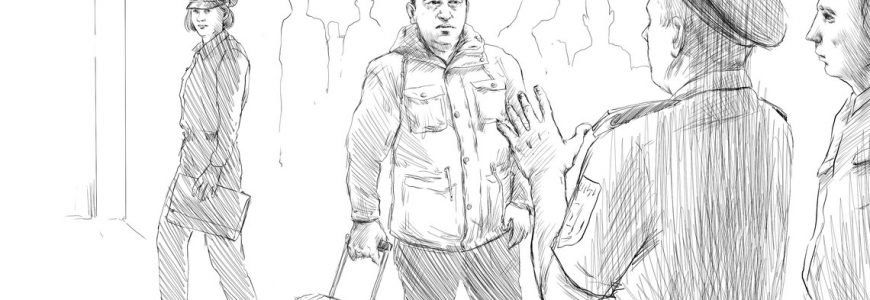The arrest of an Azerbaijani journalist in Ukraine marks a fresh instance of free-media-wary Azerbaijan having a critical reporter apprehended outside its borders.
Fikret Huseynli, who survived a beating and stabbing in his native Azerbaijan a decade ago, was arrested on October 14 at Boryspil International Airport in Kyiv as he was about to board a fight to Dusseldorf. He managed to alert his friends about his situation via Facebook before Ukrainian police took him into custody. A local court must still consider Azerbaijan’s extradition request, Ukrainian rights activists report.
The arrest sparked fears that the post-Soviet world is becoming increasingly unsafe for journalists at odds with the Azerbaijani government. In less than a year, Azerbaijan has had two journalists detained in two fellow ex-Soviet republics (Ukraine and Belarus) and is suspected of being involved in the abduction of a third in Georgia.
Now a Dutch citizen, Huseynli, a former journalist for the anti-government Azerbaijani newspaper Azadliq, is wanted in his native Azerbaijan on charges of alleged fraud, falsification of official documents and illegal migration. Ukraine’s reasons for honoring Azerbaijan’s request to arrest him are not clear.
Similar confusion met Belarus’ decision last year to detain travel blogger Alexander Lapshin, an Israeli-Russian-Ukrainian citizen, at the behest of Azerbaijan. Azerbaijani President Ilham Aliyev eventually pardoned him after Lapshin was tried and convicted in Baku on illegal-border-crossing charges.
In perhaps the most scandalous case, Azerbaijani reporter Afgan Mukhtarli was allegedly abducted from Georgia in May and put in jail in Azerbaijan. Fearing for her safety and that of their daughter, his wife, journalist Leyla Mustafayeva, left Georgia last week.
In all three of these cases, criminal charges related to Azerbaijan’s border have been filed.
International media freedom advocacy groups are dismissive of the charges brought against all three journalists and say they merely show that President Aliyev’s nearly 14-year-long rule has become one continuous slide toward autocracy.
These groups are concerned that the Azerbaijani government’s vendetta against the free press is spreading internationally as journalists critical of the Aliyev administration head abroad to continue their work.
The Institute for Reporters’ Safety and Freedom and Safety, a group led by self-exiled Azerbaijani activist Emin Huseynov, has called on Ukrainian officials to release Huseynli and “stop contributing to the repressive steps of authoritarian countries aimed at intimidating their critics living abroad.” Kyiv does not appear to have yet responded.
Huseynli faced a brutal attack in Baku in 2006, when he worked for Azadliq, a newspaper critical of the Aliyev government. Unidentified attackers broke his fingers, stabbed him and left him for dead in what Azadliq called a reprisal for its exposures of alleged government corruption. After recovering, Huseynli left the country, but reported for Turan, an outlet often described as the last local news service not toeing the government line.
Azadliq suspended operations in 2016, following the arrest of its financial director. Turan is now on the brink of closure, with the service and its editor-in-chief facing charges of tax evasion.

